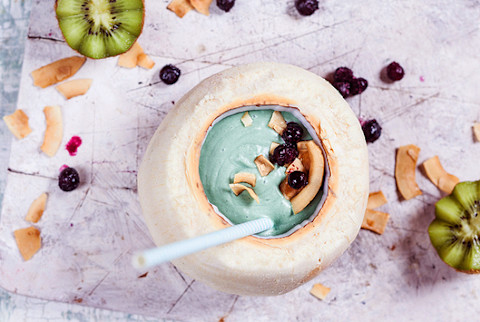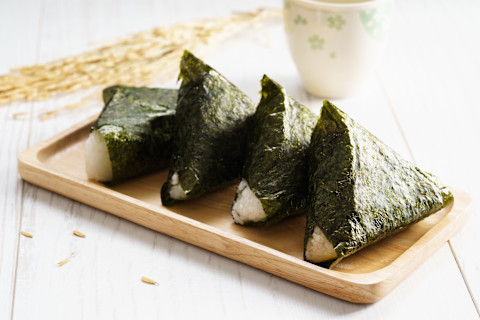Can You Use Sea Vegetables To Protect Your Thyroid & Balance Hormones?

Your thyroid hormone is the queen of all hormones. Every single cell of your body needs thyroid hormones to function optimally and when they get out of whack it can affect all aspects of your health including your metabolism, sex drive, immune system, digestion, and mood.
To be produced in the body our thyroid hormones need iodine, but your body doesn't produce this necessary element on its own. The only way to get iodine is through diet, but we aren't very good at accomplishing this because about 40 percent of the entire world is at risk for iodine deficiency. As a functional medicine expert, I'm always amazed at how many people come back again and again with low iodine levels. And while there are a variety of foods that contain iodine, there is no food more effective at boosting iodine supplies than sea vegetables like seaweed. These superfoods have an amount of iodine per serving that is unmatched by any other food medicine out there.
Welcome to the seaweed kingdom.
But what the heck are sea vegetables anyway? And where do you get them? And once you’ve bought them, how do you even eat them? Well, look no further, friends. This is your go-to guide to these superfood powerhouses.
1. Dulse:
This is a type of red algae that grows on the northern coasts of the Pacific and Atlantic oceans. It's commonly used in Ireland and Iceland to cook with and snack on. Plus, in addition to its iodine content it's an excellent source of protein.
How to use: You can purchase dulse in powdered form that can be used just like a spice to flavor everything from soup to pizza—or added to smoothies for a morning iodine boost!
2. Kombu:
This is a type of edible kelp cultivated in Japan and Korea. With kelp being the greatest iodine source out of all the sea vegetables, kombu is a great option to include in your diet.
How to use: Since it's pretty chewy it’s not usually eaten by itself. However, it can be added to other foods like soups to add flavor. In fact, it’s a common ingredient in Japanese soup stock and broths. You can also buy it powdered to add to smoothies, soups, or other dishes.
3. Kelp:
Kelp’s iodine levels are second to none. With some varieties having up to 2,984 micrograms it has the highest iodine content of any sea vegetable! It's also a rich source of magnesium, which can also be a widespread deficiency that can contribute to additional health problems.
How to use: Dried kelp flakes are crunchy, salty little pieces of delicious goodness. Add these to salads for a crouton-like crunch, to soups, or top any dish that could use a little jazzing up.
4. Nori:

This type of seaweed is what you're most familiar with as it's used to wrap sushi. It also comes in dried crunchier seaweed sheets that are perfect for snacking on.
How to use: Buy these nori sheets and make yourself some delicious sushi or wraps! Add in some of your favorite seafood, avocado, cucumber, and cauliflower rice; wrap it up; and enjoy! Perfect for a quick snack or on-the-go lunch, these are great dipped in some coconut aminos.
5. Irish moss:
Not actually a moss, this seaweed is another variety of red algae and is commonly found along the Atlantic coast of North America and Europe. Since its texture is very rubbery and leathery it's not as edible as the other seafood varieties like kelp and nori.
How to use: Best soaked in liquid, it can be added to soups or broths. When soaked in water it leaves behind a gel-like substance once the solids have been strained, which can then be used as a thickener in different recipes.
6. Arame:
This is a species of brown algae kelp mostly found in Japan and commonly sold dried.
How to use: This kelp has a slightly mild, sweeter flavor than other varieties. When added to water it can easily retain its original state after being dried and can easily be added to anything from salads to baked goods.
7. Spirulina:

This blue-green algae is a freshwater plant that is grown around the world whose health benefits go far beyond just iodine. Spirulina is about 60 percent protein, which makes it a great source of this nutrient as well as iodine. In addition, spirulina can help your body detox from heavy metals.
How to use: This powerful superfood most commonly comes in powder form. Add this to anything liquid such as tea, soups, and smoothies to get a boost of its amazing food medicinal capabilities.
Other benefits of sea vegetables.
These food medicines of the sea pack a mean punch when it comes to supplying your body with a variety of much-needed vitamins and nutrients. Spirulina, dulse, and Irish moss are great plant sources of iron, which is also important for the production1 of thyroid peroxidase—the enzyme used to make healthy thyroid hormones. B vitamins are also high in sea vegetables such as nori, which are much-needed for methylation and opening up your body's detox pathways.
As the awareness of sea vegetables continues to grow, so does their availability. You don't have to go to a specialty store to get these, as Whole Foods carries a large variety. Amazon is also a great source if you do not have a Whole Foods or other natural health food store near you. When buying sea vegetables you need to make sure you are buying reputable brands that source their products sustainably. If you are getting sea vegetables from a contaminated water source containing toxins or other chemicals the sea vegetables will be contaminated as well. Thankfully, the U.S. Food and Drug Administration has very high standards for commercial sea vegetables.
Iodine supplements versus sea vegetables.
Maybe the idea of eating seaweeds grosses you out. So why can't you just take an iodine supplement? In addition to getting all of the other important nutrients and the synergistic magic of a real food, getting iodine in a pill isn't the best option for many thyroid cases. This is very important to understand because iodine is given out as the natural solution to thyroid problems but can trigger a thyroid storm for autoimmune cases. While iodine is needed for thyroid hormone production, several studies have found2 that increased iodine intake is associated with Hashimoto's disease.
Research has also found3 that increase in thyroid antibodies is associated with iodine supplementation. It's for this reason that I prefer getting a balanced source of iodine with all of the other uber-important nutrients from seaweeds. For autoimmune thyroid cases I also suggest limiting kelp intake because of its higher iodine content and focus rather on some of the other varieties. We are all different. Even with healthy foods, what works for one person may not be right for you.
Want to add some seaweed to your diet but aren't sure where to start? Try this delicious soup recipe to get in a couple of different varieties!
Sea Vegetable Whitefish Soup
Ingredients:
- 2 pieces of kombu kelp (roughly 3-inch squares)
- 1 cup lightly packed bonito flakes
- 4 cups water
- 2 to 6 ounces tilapia or cod fillets
- 1 lb. kelp noodles
- 2 tablespoons coconut aminos
- 1 tablespoon coconut water vinegar
- 4 cups loosely packed greens
Method:
Place kombu and bonito in water in a large pot and bring to a boil. Reduce heat and simmer for 10 minutes. Meanwhile, chop greens and cut the fish into 1- to 2-inch cubes. Cook kelp noodles as per directions on package. Pour broth through a strainer lined with cheesecloth to remove bonito and kombu. Return the broth to the heat and add coconut aminos and coconut water vinegar. Add the fish and simmer for 5 minutes or until fish is cooked through. If you are using tougher greens—such as bok choy, cabbage, snow peas, or kale—add them at the same time as the fish. For more tender greens—such as spinach, chard, or beet greens—add them after the fish is cooked and simmer one minute to wilt. Add the kelp noodles and simmer.

Will Cole, IFMCP, DNM, D.C., is a leading functional medicine expert who consults people around the globe, starting one of the first functional medicine telehealth centers in the world. Named one of the top 50 functional and integrative doctors in the nation, Dr. Will Cole provides a functional medicine approach for thyroid issues, autoimmune conditions, hormonal imbalances, digestive disorders, and brain problems. He is the host of the popular The Art Of Being Well podcast and the New York Times bestselling author of Intuitive Fasting, Ketotarian,The Inflammation Spectrum, and Gut Feelings.
More from the author:
Functional Nutrition Training
Check out Functional Nutrition Coaching
A cutting-edge nutrition deep dive taught by 20+ top health & wellness experts
Learn moreMore from the author:
Functional Nutrition Training
Check out Functional Nutrition Coaching
A cutting-edge nutrition deep dive taught by 20+ top health & wellness experts
Learn more
Will Cole, IFMCP, DNM, D.C., is a leading functional medicine expert who consults people around the globe, starting one of the first functional medicine telehealth centers in the world. Named one of the top 50 functional and integrative doctors in the nation, Dr. Will Cole provides a functional medicine approach for thyroid issues, autoimmune conditions, hormonal imbalances, digestive disorders, and brain problems. He is the host of the popular The Art Of Being Well podcast and the New York Times bestselling author of Intuitive Fasting, Ketotarian,The Inflammation Spectrum, and Gut Feelings.
